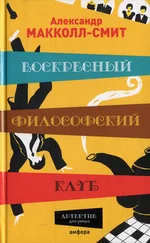Mma Ramotswe took a sip from the glass of water. ‘It is a strange story, Mma. You see, I am Mma Ramotswe of the No. 1 Ladies’ Detective Agency. I am a person who helps people with their problems. Lakshmi’s cousin came to see me and told me about her, although he did not give me her name. He said he wanted me to find out who she is.’
Maria’s expression was one of puzzlement, and Mma Ramotswe told her that the story was even more complicated. She decided to tell her everything, and over the next few minutes explained what she had been asked to do, and why. Maria listened intently; at the end she sat down heavily on a kitchen chair and sank her head in her hands. ‘This is hopeless,’ she said. ‘If the immigration people find out who she is they will check her name against the list they get from the police over the border. Those police give them lists of people they’re looking for, so they can check any residence permit applications from South Africa. If the immigration people find her name on that list, they will simply send her back over the border – into the arms of the police.’
‘And of her husband,’ added Mma Ramotswe.
‘Exactly,’ said Maria.
Mma Ramotswe put down the empty glass. ‘We cannot let that happen, Mma,’ she said. ‘We cannot.’
Chapter Thirteen
The Dish of Yesterday
If Mma Ramotswe had Sengupta affairs to keep her busy, Mma Makutsi was almost entirely preoccupied with the Handsome Man’s De Luxe Café. The work on the kitchen had been accomplished even more quickly than promised, as had the painting and the delivery of the tables and chairs. There was now a café, even if the paint was still not completely dry here and there, and despite the fact that some of the kitchen shelves had yet to be cut to size and put up. What mattered was that the public could be invited to begin using the café at eight o’clock the next morning. Breakfast would be available until eleven o’clock, at which point lunch would be on the menu until two. Dinner would be served from six o’clock onwards, and the café would shut its doors at nine. This was to be the pattern of the new business.
Phuti had warned Mma Makutsi about staff. ‘That is going to be your problem, Grace,’ he said. ‘There are plenty of people looking for work, but how many of these are the right person?’ He shook his head sadly, as memories returned of his own experience at the Double Comfort Furniture Store. ‘I can tell you, that’s the problem every business faces – getting staff you can trust.’
She had taken the warning seriously: Phuti knew what he was talking about when it came to running a business. And when it came to unsuitable employees, his views were, of course, coloured by the fact that he had employed none other than Violet Sephotho in the bed department of the store. That had been a complete debacle, as he had eventually discovered that Violet’s impressive sales record was entirely attributable to the unconventional and unauthorised inducements she put the way of male customers. That was a famous case, but there was also the equally awkward case of the employee who was found to be stealing furniture from the store. The size of furniture normally prevents its being stolen from under the noses of the management, but in this case the employee had been removing items of furniture piece by piece, disassembling tables and chairs and then removing them leg by leg, seat by seat, over a period of days.
‘You have to be careful, Grace,’ said Phuti. ‘You never know.’
You never know . She had pondered the words. No, one never knew, but just as you never knew what difficulties you might encounter, you also never knew about the positive things the future might hold.
‘I shall be very careful, Phuti,’ she said. ‘But I have a good chef, remember, and he is the one who has chosen the waiting staff. He has the contacts, you see.’
Phuti looked doubtful. ‘But you are the boss. You should choose these people.’
‘The chef is the one who’ll be working with them,’ she said. ‘He must have a good relationship with them.’
Phuti remained sceptical. ‘You are the manager, Grace. A manager must manage.’
‘I shall manage,’ she reassured him. ‘I am getting ready to do a lot of managing.’
Phuti had another query. ‘Have you planned the menu yet?’
‘The chef is doing that. That is his department.’
‘I see.’
She sought to reassure him further. ‘He has been working on all of this, Phuti. He has found a good waiter and a good waitress. They are very experienced, apparently. And he has written out the menu. I am going to type it up.’
She handed her husband the sheet of paper that Thomas had passed on to her. There were greasy fingerprints down the side of it – ‘That is because it is written by a chef,’ explained Mma Makutsi.
Phuti struggled to decipher the chef’s handwriting. ‘Small mouth,’ he said. ‘What is this about mouths? Small mouth, and I see he has something called big mouth.’
Mma Makutsi smiled. ‘That is the fashionable term, Phuti. Small mouth refers to the size of the portion. That is the first course, you see. You start with the small mouth and then you move on to the big mouth.’
Phuti shrugged. ‘Why doesn’t he say first course and second course ?’
Mma Makutsi did not answer the question. ‘What do you think about the dishes? They are very tempting, aren’t they?’
Phuti read down the list. Under Small Mouth there were various items on toast: Scrambled Eggs on toast. Sardines and Baked Beans on toast. Cheese and Pineapple on toast. Sliced Sausages and Tomato Sauce on toast. ‘There is a lot of toast,’ he observed.
Mma Makutsi replied that this was quite normal. ‘Many people will want a quick snack,’ she said. ‘They do not want to be sitting for a long time waiting for their food to be prepared. They want food they can eat quickly and then get on with their busy lives.’ She paused. ‘These people are busy executives, you see. They are the people who are going to want toast.’
Phuti moved on to the Big Mouth list. She watched his lips move as he read – a habit of his that she always meant to talk to him about but had never broached. ‘This is a very interesting menu,’ he said at last. ‘This chef…’
‘He has a lot of experience,’ Mma Makutsi said hurriedly. ‘He trained in these big hotels – the Sun, the Grand Palm – all those big, important places.’
Phuti did not argue. ‘I’m sure he did, Grace. It’s just that some of these dishes are…’
She finished the sentence for him. ‘Unusual. Yes, they will be the talk of the town. I am quite sure of that, Phuti.’
Phuti returned to the menu. ‘What is this Dish of Yesterday ?’ he asked, pointing to an item at the head of the list.
Mma Makutsi laughed nervously. ‘Oh, he told me about that when he gave me the menu. It is the leftovers from the day before.’
‘Usually menus have a dish of the day,’ said Phuti mildly. ‘I’ve never seen a dish of yesterday.’ He glanced at her reproachfully. ‘You shouldn’t tell people that they’re having leftovers, you know. People don’t like that. It’s as bad as saying “second-hand food”.’
Mma Makutsi’s eyes widened. ‘Oh no, Rra! It is nothing like that.’
‘I’m just expressing an opinion,’ said Phuti. ‘I am not one to judge these things, I am saying what I think.’
She considered this. It was a curious thing to say; anybody who said anything at all was making a judgement, and she did not see how claiming that you were only expressing an opinion changed that. There was no time for such discussion, though, as Phuti Radiphuti had moved on to the next item on the menu.
Читать дальше







![Александр Макколл Смит - Отдел деликатных расследований [litres]](/books/397661/aleksandr-makkoll-smit-otdel-delikatnyh-rassledova-thumb.webp)




